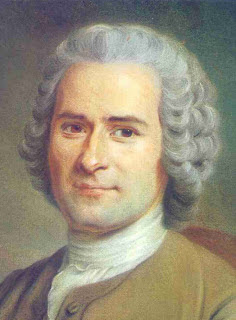Father: Isaac Rousseau (watchmaker).
Mother: Suzanne Bernard Rousseau (d. Jul-1712).
Girlfriend: Madame Louise de Warens.
Wife: Thérèse Lavasseur (seamstress, 5 children).
Date of Birth: 28 June 1712.
Birth Place: Geneva, Republic of Geneva.
Date of Death: 2 July 1778 (aged 66).
Death Place: Ermenonville, Kingdom of France.
Cause of Death: Stroke.
Remains/Buried: Panthéon, Paris, France.
Remains/Buried: Panthéon, Paris, France.
Gender: Male.
Religion: Roman Catholic.
Race or Ethnicity: White.
Occupation: Philosopher, Sociologist.
Nationality: Swiss, French.
Notable Ideas: General will, amour-propre, moral simplicity of
humanity, child-centered learning, civil religion, popular sovereignty,
positive liberty.
Influenced By: Aristotle, Cicero, Niccolò Machiavelli, Baruch Spinoza, Leibniz, Michel de Montaigne, Hugo Grotius, Samuel von Pufendorf, Thomas Hobbes, John Locke, Jean Barbeyrac, Jean-Jacques Burlamaqui, Denis Diderot.
Influenced: The French Revolution, Robespierre, Johann Gottlieb Fichte, Friedrich Hegel, Alexis de Tocqueville, Romanticism, Auguste Comte, Karl Marx, Friedrich Engels, Leo Strauss, Mary Shelley, Maine de Biran, Frederick Neuhouser, Mikhail Bakunin, Maria Montessori, Leo Tolstoy, John Rawls, Michel Clouscard, Mustafa Kemal Atatürk.
Genevan philosopher, Sociologist, writer, and composer Jean-Jacques
Rousseau (28 June 1712 – 2 July 1778) is well-known for his book Social Contract
in 1762. His political philosophy inspired the leaders of the French
Revolution and the American Revolution and influenced the Romanticism
movement.
Childhood & Early Life: Jean-Jacques Rousseau was born in Geneva, Switzerland, the second son of
Isaac Rousseau, and Susanne Bernard. After one week later of his born
his mother died. After accused him of trespassing into his properties,
Rousseau was sent in a hamlet outside Geneva for two years by his
maternal uncle. Staying at the hamlet, Rousseau studied mathematics and
drawing. In 1727, He ran away from Geneva and took shelter with a Roman
Catholic priest in Savoy at the age of 15. In 1737, he received a small
portion of his mother’s inheritance and partly used it to repay De Warens
for her financial support. In 1739, he took a tutor job in Lyon.
Personal Life: When Rousseau when went in Savoy, he introduced with de Warens. When he
turned 20, the relationship between Rousseau and De Warens turned into a
romantic one. She always remained a great influence in his life. It was
believed that in 1768, Rosseau sort of married Thérèse Lavasseur. But
this time it was illegal to marriages between Catholics and Protestants.
They had five children.
Later Life & Death: Rousseau had interest in music. For this reason, in 1742, he moved to
Paris to present his new system of numbered musical notation. In 1743,
He published Dissertation sur la musique moderne, scheme for musical notation. His interest in music spurred him to write two operas— Les Muses galantes (1742) and Le Devin du village (1752). He also wrote the Lettre sur la musique française (1753) and the Dictionnaire de musique
(1767) for music. He worked as a secretary to the Comte de Montaigue,
the French ambassador to Venice between 1743 to 1744. In 1754, Rousseau
published a book arguing that the natural, moral state of man had been
corrupted by society named Discourse on the Origin and Foundations of Inequality. He published a massive 800-page novel, Julie, ou la nouvelle Héloïse in 1761. The Next year, he published The Social Contract, which made him famous. In 1766, settled in England and wrote his Confessions. In 1767, he returned to France using a false name. Three later Rousseau was allowed to enter Paris. In 1776, he finished writing DialoguesRousseau Judge of Jean-Jacques. At the of 66, he died on 2 July 1778 and he was buried at Panthéon in Paris, France.



0 Comments